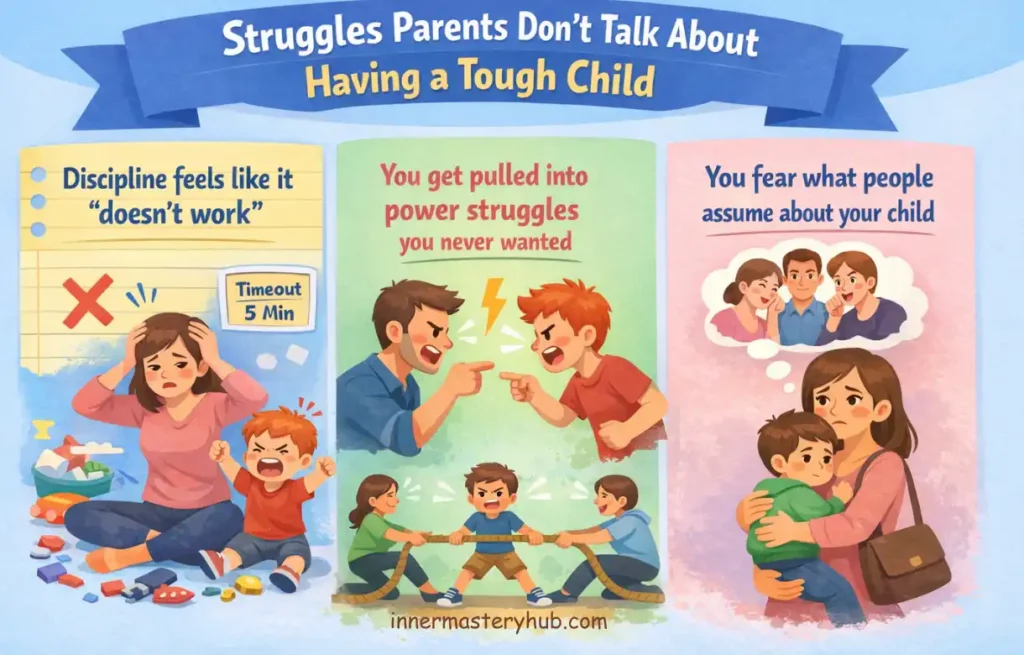How Emotionally Unavailable Parents Shape Your Childhood

Many people find it distressing to have emotionally inaccessible parents. These parents may provide for their children’s necessities, but they struggle to establish an emotional bond with them, which is crucial for a child’s proper development. The lack of emotional sensitivity can have a detrimental effect on your relationships, overall well-being, and sense of self.
In addition to discussing the potential repercussions of growing up in such an environment, this blog article aims to highlight the telltale signs of emotionally unavailable parents and provide helpful suggestions for fostering meaningful relationships.
What Is An Emotionally Unavailable Parent?
A parent who finds it difficult to establish an emotional connection with you is considered an emotionally unavailable parent. It may be challenging for you to feel close to them or express your emotional needs, as they appear distant or detached. When you try to chat with them, you can discover that they don’t seem to nurture your feelings and provide emotional support.
These parents may struggle to express their emotions or understand yours, leaving you feeling misunderstood and neglected. You might crave their love and attention, but find it hard to connect with them or to feel like they genuinely care about you.
A parent who is constantly aloof and emotionally detached is also called cold mother syndrome, cold father syndrome, or emotionally immature parents.
What Are The Types Of Emotionally Unavailable Parents?
Emotionally unavailable parents can come in many different forms, and their particular behaviors might affect how they interact with you. These are a few typical types:
The Distant Parent
Parents who are present physically but emotionally separated. They may have too many obligations, hobbies, or occupations to be emotionally involved. For example, it’s possible that your father works long hours and is too worn out to discuss the day with you. Even though you and your parent are together, you could feel emotionally separated.
The Critical Parent
This parent criticizes your feelings, opinions, and accomplishments abruptly. Instead of encouraging you, they may criticize your mistakes. Your mother may continuously criticize your appearance, grades, or choices, making you feel inferior. Their frequent criticism can lower your self-esteem and make you reluctant to speak with them.
The Absent Parent
Emotionally or physically, this parent is not present. Absent, separated, or divorced because of work, drug usage, etc. Your father or other caregivers may have raised you after your mother abandoned you when you were a small child. Even if they are not physically there, you may still feel abandoned and uneasy due to an emotional void.
15 signs of an emotionally unavailable parent
The child of an emotionally unavailable parent may suffer through the following setbacks;
- Absence of affection or emotional expression towards you.
- Struggle to understand your opinions or feelings.
- They avoid meaningful conversations
- Putting their wants and needs above yours.
- Unstable or inconsistent presence in your life.
- It would be best to have others acknowledge or appreciate your achievements.
- Blaming you for their mistakes or problems.
- Rarely express their own emotions freely.
- Primarily focused on fulfilling their own needs.
- Difficulty apologizing or taking responsibility for their actions.
- May view spending quality time together as a burden.
- Using guilt or manipulation to control your behaviour.
- Difficulty setting healthy boundaries
- Privacy is highly valued, and open communication is discouraged.
- Tendency to shut down or withdraw during conflicts or disagreements.
Effects of Emotionally Unavailable Parents on the child’s mental growth
Children of emotionally unavailable parents can experience psychosomatic symptoms, internalizing and externalizing symptoms, delays in development, and decreased mental health. Below are some signs your parents were emotionally unavailable;
- Low self-esteem
- Difficulty trusting others
- Difficulty forming a secure attachment style
- Codependency and unhealthy relationship patterns.
- Depression and other mental health issues
- Difficulty expressing your own emotions.
- Difficulty setting personal goals.
- Fear of abandonment and intimacy issues.
- Development of maladaptive coping mechanisms.
- Emotional numbness or detachment.
- Persistent feelings of loneliness and isolation.
- Impaired social and communication skills.
- Increased risk of engaging in abusive relationships.
How to heal from emotionally unavailable parents
It can be challenging to recover from the effects of emotionally unavailable parents, but it is achievable with patience, perseverance, and support. The following actions can help you start the healing process:
According to the outcomes of a 2017 study, the emotional availability of both fathers and mothers was associated with favourable outcomes in terms of mental health, emotional regulation, relationship success, and social support as children progressed into adulthood. Below are some strategies to heal from the effects of having emotionally unavailable parents.

Cultivate supportive relationships
Be in the company of individuals who love and support you without conditions and who accept you for who you are. The impacts of emotional unavailability can be reduced, and a source of consolation and validation can be found by developing a solid support network.
Let go of unrealistic expectations.
You cannot change them or make them emotionally available, no matter how much you want to. Instead, accept their flaws and issues. Releasing the expectation that your parent will change can help you overcome the disappointment and anger that come with holding out hope for something that materialises.
Understand that their emotional unavailability stems from their own personal challenges and limitations rather than a reflection of their worth.
Change your perception
Think about the generational context in which your parent grew up. Consider how family relationships, cultural expectations, and societal conventions shaped their attitudes and actions.
Determine whether your parent has any unresolved previous trauma. You can better understand their behaviour by recognising that they might be repeating patterns they developed during their upbringing, influenced by their parents’ difficulties.
Focus on your healing.
Ideally, you should focus on your recovery. Allow yourself the time and resources to support your mental health and personal growth. Practice self-care that makes you feel better, such as meditation, exercise, or a hobby.
Family, friends, or a mental health professional are examples of emotionally available people who will support and encourage you. Please make the most of your time with them. Through introspection and reestablishing your connection with your inner child, you might be able to recuperate.
Surround yourself with people who respect and accept you for who you are. Start engaging in activities and interests that bring you joy and fulfilment, like volunteering or creating art. By investing in your recovery, you may overcome obstacles and develop resilience.
The emotional availability assessment
The Emotional Availability Assessment, developed by Dr Zeynep Biringen, evaluates the sensitivity, structure, non-intrusiveness, and non-hostility of parent-child interactions. The involvement and response of the youngster are also taken into account.
Based on these results, parents are classified as complicated, emotionally available, disconnected, or troublesome. While problematic parents might occasionally display warmth, emotionally available parents behave in a nurturing manner.
Problematic parents often neglect their children and may exhibit animosity, while detached parents appear distant. This evaluation offers insights into the relationships between parents and children, informing interventions designed to promote positive attachments.
Adult Children of Emotionally Unavailable Parents
Because they experienced emotional neglect, adult children of emotionally immature parents may experience mental health problems. Among the issues that emotional neglect and a lack of support can aggravate are depression, anxiety disorders, and low self-esteem. Developing positive connections, managing emotions effectively, and living satisfying lives can be challenging for some individuals.
Moreover, ongoing stress brought on by unresolved emotional issues from childhood, raised by emotionally unavailable narcissistic parents can make mental health problems worse. Below are some examples;
- Anxiety disorder (generalised anxiety disorder, social anxiety disorder, or panic disorder)
- Post-traumatic stress disorder (PTSD) or childhood trauma
- Borderline personality disorder (BPD)
- Avoidant personality disorder (AvPD)
- Narcissistic personality disorder
What does “emotionally unavailable parent” mean?
It means a parent who empathises and connects emotionally with their child. They may be distant, dismissive, or preoccupied, leaving the child’s emotional needs unmet.
What are the signs that my parents are emotionally unavailable?
Signs include a lack of active listening, failing to validate your emotions, rarely spending one-on-one time, avoiding emotional conversations, being critical or distant, and failing to offer comfort during times of distress.
How does emotional unavailability in parents affect children into adulthood?
Effects can include low self-esteem, fear of intimacy, difficulty trusting others, emotional regulation issues, overdependence or avoidance in relationships, and identity confusion.
Can emotionally unavailable in parents change?
Yes—but change is often slow and requires self-awareness, therapy, willingness, and emotional growth. They must learn to validate their feelings, communicate effectively, and remain present consistently.
Why would parents become emotionally unavailable parents?
Causes may include their own childhood trauma or neglect, lack of emotional modelling, mental health struggles, stress, or simply not having the emotional capacity to be present.
How can I heal from having emotionally unavailable parents?
Healing steps include therapy (especially attachment-based), inner child work, building emotionally safe relationships, journaling, practising self-compassion, and reparenting yourself emotionally.
How do emotionally unavailable parents affect my relationships?
You might find yourself avoiding vulnerability, being anxious or avoidant in intimacy, seeking excessive validation, fearing abandonment, or repeating unhealthy patterns.
How do I cope with emotionally unavailable parents now?
Set boundaries, lower unrealistic expectations, seek emotional support elsewhere (friends, therapy), accept what can’t be changed, and practice self-validation and self-care.
Is it my fault they were emotionally unavailable parents?
No. Their emotional unavailability is about their capacities, not your worth. You didn’t cause it, and you aren’t to blame for their emotional limitations.
Should I confront them about it?
You may—but do so gently and safely. Use “I” statements (e.g., “I feel unheard when…”), express your needs, and be ready for limited change. Therapists often recommend this only if it’s safe.






